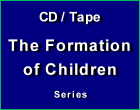Formation of Children
 |
 |
 |
 |
 |
 |
 |
Fighting the ‘Toy Mentality’
with Babies at Mass
A lady recently sent TIA a letter asking two question: one about dealing with persons who play with her baby during Mass, and the other about inviting Protestants for dinner:
Greetings Tradition in Action,
Firstly, thank you for all of the work you have done. My husband and I recently finished reading Courtesy Calls Again. We cannot praise this work highly enough.
Our first child, J.B., is just shy of six months old. By God's grace, we quickly saw in us the revolutionary tendencies you wrote of such as jesting too much with children, and treating them as objects of amusement.
This "toy mentality" might be especially bad in Traditionalist circles. Those who have had the blessing of little children in the home for 20 years delight so much in them, and find difficulty in tempering that delight. We want to encourage parishioners to cease making J.B. the center of attention so he does not become egotistical.
I think it rightly ordered for adults to be especially warm with children. But there is a difference in warmth towards children, and making conversations child-centered and petting them like puppies. Many times people will ask to hold him without even making eye contact with us, let alone speaking with us.
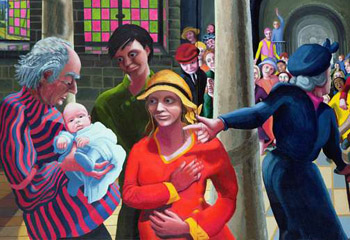 In our Traditional Latin Mass parish, we have signs requesting silence. We are grieved that despite the sound rule of silence, people turn their backs to Christ and turn toward J.B.. They wave to him, talk to him and even try to grab him from us. They do this despite the fact we cast our eyes to the ground in prayer and in no way elicit these greetings.
In our Traditional Latin Mass parish, we have signs requesting silence. We are grieved that despite the sound rule of silence, people turn their backs to Christ and turn toward J.B.. They wave to him, talk to him and even try to grab him from us. They do this despite the fact we cast our eyes to the ground in prayer and in no way elicit these greetings.
We try to set a good example for our son by maintaining silence and praying in thanksgiving for Holy Communion. People will ask to hold our son while we are overtly praying on our knees, hands clasped and head bowed. To make matters worse, our priest does not observe silence in the chapel; we think this may be why the laity justify unnecessary talking.
Do you have any suggestions on how to shield our son from the irreverence of others? How do we protect his innocence and enforce the noble ideal of taking children seriously? For example, would it be prudent to overtly turn our son away from those who faun over him in the chapel?
And what do we do when, after Holy Mass, people are fawning over him and ignoring us, breeding egoism in this soul entrusted to our care. We want to correct in meekness and humility. It is easy to correct peers and children charitably and discreetly, but dealing with those thirty years our senior is a more fragile matter.
Lastly, we have a question regarding Protestants. We befriended a Protestant couple before becoming Traditionalists. We are no longer familiar with obstinate Novus Ordo attendants or Protestants, and keep those bad influences away from our family.
However, a Protestant couple we befriended in our Novus Ordo days invited us over to dinner. We informed them that we will not treat them as if we have the same faith any longer. They still wanted us to dine with them despite the new tension. They are open to hearing the doctrines of the Holy Faith. We want to share with them the writings of the priesthood by St. Bellarmine and St. John Fisher. We have prayed for their conversion even more than we have studied.
Is it permissible to be present at the dinner table when a Protestant is saying grace, so as long as there is not heretical or blasphemous content? We would invite them to our home, but we do not have the space to host this couple and their five children. If you have the time, we would greatly appreciate your insight into these subjects.
High regards,
Mr. and Mrs. L.P.
Dr. Horvat responds:
Greetings Mr. and Mrs. L.P.,
I congratulate you for your attitude of seriousness, both in the formation of your young son and in your non-ecumenical spirit in the home. I also thank you for your compliments for our work and am gratified by your trust in TIA to give counsel on these sensitive matters.
Regarding the first question, about the parishioners who fawn over your son during and after Mass: It is very sad that in traditionalist parishes the pastors do not enforce due silence and reverence inside the church. If they did so, this would resolve much of your problem.
I believe your vigilance is a sign of a good counter-revolutionary spirit. If we were all more serious in our outlook on life in relation to our vocations and the Counter-Revolution, it would result in more appropriate and fraternal treatment of each other and we would have a joy in our convivium that would lighten the weight of the other crosses and difficulties we have to carry.
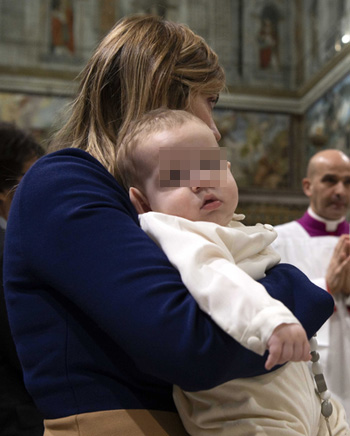 Now then, if you strive to have this tranquil and joyful seriousness in your home and apply it in your relations with your son, you will find that he will develop a natural tranquility of soul, which is the essence of a true well-being. He will take his first cues of life from you, father and mother, and especially the mother who is with him more often.
Now then, if you strive to have this tranquil and joyful seriousness in your home and apply it in your relations with your son, you will find that he will develop a natural tranquility of soul, which is the essence of a true well-being. He will take his first cues of life from you, father and mother, and especially the mother who is with him more often.
If you are always joking and laughing, seeking new vibrations of soul and thrills, he will take on that same nervous and excitable spirit. If you are temperate and ordered, he will reflect this spirit and develop his personality in a calm, recollected peace of soul.
In short, in this first stage of his life, the most important factor is how you act in the family home, where he spends most of his time. You are the ones who will set the real tone for his first formation. It is good to have the support of family members and close friends, as you noted, who will appreciate your desire not to make your children the center of attention with constant petting and photo/video sessions. With these persons you can confide your expectations and ask for their compliance.
Children at Mass
There is a custom in Latin countries, especially in Portugal, to not bring little children to church until they are older and can resist this kind of public contact, which, as you have observed very well, can spoil your child and make him egocentric. The young children in Portugal stay at home where a grandmother, an aunt or a baby sitter will care for them until the parents return.
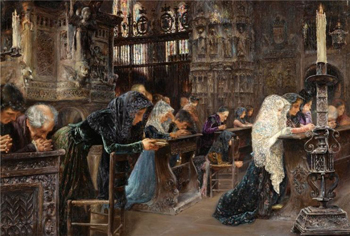 Even though I see that the American mentality has difficulties in accepting this solution, and sometimes it is impracticable given the long distances families travel to a Tridentine Mass, I leave it for your consideration, since it could be a simple solution for many of the problems you pointed out.
Even though I see that the American mentality has difficulties in accepting this solution, and sometimes it is impracticable given the long distances families travel to a Tridentine Mass, I leave it for your consideration, since it could be a simple solution for many of the problems you pointed out.
Supposing that this is not feasible for you, I go on to offer several alternative suggestions.
In the church, perhaps one of the best ways to avoid the problem of having your child attract unwanted attention would be sit regularly in one of the first rows. I knew a lovely couple with 11 children who always sat in the first row and set a good example for the whole church by the exemplary behavior of their children.
Another polite solution to those who turn around to talk and/or fondle your son would be to smile kindly, make a gesture of keeping silence, and whisper: "Let's talk after Mass." Again, this small remonstrance would set a good example and signal that you are trying to follow the good customs of the past inside the Church.
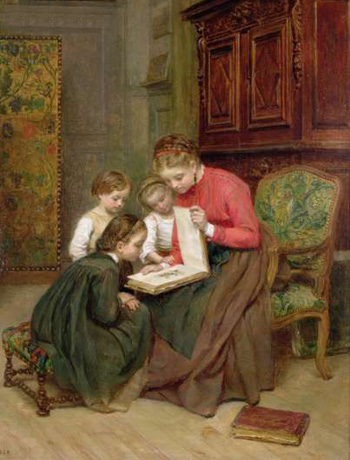 The tendency of so many persons to fawn over children is a consequence of a society with so few children. In the pre-Vatican II days, many Catholic families in a parish would have more than three children, and thus babies were not treated like precious curio items: "Let me hold him!" "Oh, how darling!" etc.
The tendency of so many persons to fawn over children is a consequence of a society with so few children. In the pre-Vatican II days, many Catholic families in a parish would have more than three children, and thus babies were not treated like precious curio items: "Let me hold him!" "Oh, how darling!" etc.
Babies were accepted and appreciated as precious souls, but as part of the normal cycle of life. Grandparents had their own grandchildren, and usually many of them, and did not feel the need to "cherish" the children of others, especially of strangers or distant friends.
Given the serious ambience you are creating in your home and that, therefore, surrounds him normally, I hope that these hours spent in church will not have a deleterious and permanent influence over the psychology of your son. In any case I would not suggest that you correct elderly persons.
Socializing with Protestants
Regarding your second question, you are correct that as a rule you should not accept invitations by Protestants to meals for social purposes. However, in this case, since the purpose is proselytism, I believe it would not be wrong to do so. I think that the principle of double-effect applies and you can have a meal with them.
 I would recommend you should not join in their prayers. Since these are persons of good will who seem to be open to learn about the Catholic Faith, you could politely tell them beforehand that you will say the Catholic
Prayers before and after Meals in silence and not follow them in their Protestant prayers.
I would recommend you should not join in their prayers. Since these are persons of good will who seem to be open to learn about the Catholic Faith, you could politely tell them beforehand that you will say the Catholic
Prayers before and after Meals in silence and not follow them in their Protestant prayers.
I hope this is of some help to you.
Cordially,
Marian T. Horvat, Ph.D.

Greetings Tradition in Action,
Firstly, thank you for all of the work you have done. My husband and I recently finished reading Courtesy Calls Again. We cannot praise this work highly enough.
Our first child, J.B., is just shy of six months old. By God's grace, we quickly saw in us the revolutionary tendencies you wrote of such as jesting too much with children, and treating them as objects of amusement.
This "toy mentality" might be especially bad in Traditionalist circles. Those who have had the blessing of little children in the home for 20 years delight so much in them, and find difficulty in tempering that delight. We want to encourage parishioners to cease making J.B. the center of attention so he does not become egotistical.
I think it rightly ordered for adults to be especially warm with children. But there is a difference in warmth towards children, and making conversations child-centered and petting them like puppies. Many times people will ask to hold him without even making eye contact with us, let alone speaking with us.

An almost comical mania to hold and fondle babies...
We try to set a good example for our son by maintaining silence and praying in thanksgiving for Holy Communion. People will ask to hold our son while we are overtly praying on our knees, hands clasped and head bowed. To make matters worse, our priest does not observe silence in the chapel; we think this may be why the laity justify unnecessary talking.
Do you have any suggestions on how to shield our son from the irreverence of others? How do we protect his innocence and enforce the noble ideal of taking children seriously? For example, would it be prudent to overtly turn our son away from those who faun over him in the chapel?
And what do we do when, after Holy Mass, people are fawning over him and ignoring us, breeding egoism in this soul entrusted to our care. We want to correct in meekness and humility. It is easy to correct peers and children charitably and discreetly, but dealing with those thirty years our senior is a more fragile matter.
Lastly, we have a question regarding Protestants. We befriended a Protestant couple before becoming Traditionalists. We are no longer familiar with obstinate Novus Ordo attendants or Protestants, and keep those bad influences away from our family.
However, a Protestant couple we befriended in our Novus Ordo days invited us over to dinner. We informed them that we will not treat them as if we have the same faith any longer. They still wanted us to dine with them despite the new tension. They are open to hearing the doctrines of the Holy Faith. We want to share with them the writings of the priesthood by St. Bellarmine and St. John Fisher. We have prayed for their conversion even more than we have studied.
Is it permissible to be present at the dinner table when a Protestant is saying grace, so as long as there is not heretical or blasphemous content? We would invite them to our home, but we do not have the space to host this couple and their five children. If you have the time, we would greatly appreciate your insight into these subjects.
High regards,
Mr. and Mrs. L.P.
______________________
Dr. Horvat responds:
Greetings Mr. and Mrs. L.P.,
I congratulate you for your attitude of seriousness, both in the formation of your young son and in your non-ecumenical spirit in the home. I also thank you for your compliments for our work and am gratified by your trust in TIA to give counsel on these sensitive matters.
Regarding the first question, about the parishioners who fawn over your son during and after Mass: It is very sad that in traditionalist parishes the pastors do not enforce due silence and reverence inside the church. If they did so, this would resolve much of your problem.
I believe your vigilance is a sign of a good counter-revolutionary spirit. If we were all more serious in our outlook on life in relation to our vocations and the Counter-Revolution, it would result in more appropriate and fraternal treatment of each other and we would have a joy in our convivium that would lighten the weight of the other crosses and difficulties we have to carry.

A baby can easily be the center of attraction and a distraction at Mass
If you are always joking and laughing, seeking new vibrations of soul and thrills, he will take on that same nervous and excitable spirit. If you are temperate and ordered, he will reflect this spirit and develop his personality in a calm, recollected peace of soul.
In short, in this first stage of his life, the most important factor is how you act in the family home, where he spends most of his time. You are the ones who will set the real tone for his first formation. It is good to have the support of family members and close friends, as you noted, who will appreciate your desire not to make your children the center of attention with constant petting and photo/video sessions. With these persons you can confide your expectations and ask for their compliance.
Children at Mass
There is a custom in Latin countries, especially in Portugal, to not bring little children to church until they are older and can resist this kind of public contact, which, as you have observed very well, can spoil your child and make him egocentric. The young children in Portugal stay at home where a grandmother, an aunt or a baby sitter will care for them until the parents return.

Adults and older children assist at a Mass in Germany; babies at home or with family members
Supposing that this is not feasible for you, I go on to offer several alternative suggestions.
In the church, perhaps one of the best ways to avoid the problem of having your child attract unwanted attention would be sit regularly in one of the first rows. I knew a lovely couple with 11 children who always sat in the first row and set a good example for the whole church by the exemplary behavior of their children.
Another polite solution to those who turn around to talk and/or fondle your son would be to smile kindly, make a gesture of keeping silence, and whisper: "Let's talk after Mass." Again, this small remonstrance would set a good example and signal that you are trying to follow the good customs of the past inside the Church.

A serene home environment is the most important factor in forming a child
Babies were accepted and appreciated as precious souls, but as part of the normal cycle of life. Grandparents had their own grandchildren, and usually many of them, and did not feel the need to "cherish" the children of others, especially of strangers or distant friends.
Given the serious ambience you are creating in your home and that, therefore, surrounds him normally, I hope that these hours spent in church will not have a deleterious and permanent influence over the psychology of your son. In any case I would not suggest that you correct elderly persons.
Socializing with Protestants
Regarding your second question, you are correct that as a rule you should not accept invitations by Protestants to meals for social purposes. However, in this case, since the purpose is proselytism, I believe it would not be wrong to do so. I think that the principle of double-effect applies and you can have a meal with them.

Don't join in with those Protestant meal prayers
I hope this is of some help to you.
Cordially,
Marian T. Horvat, Ph.D.

Postedd September 10, 2019
______________________
______________________






